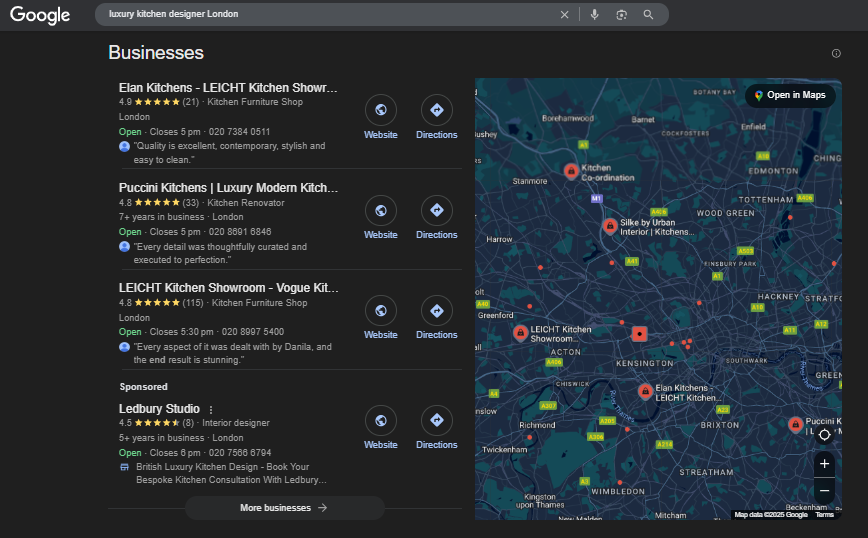
Enterprise Local SEO for Luxury Kitchens & Bathrooms in London
Published September 10, 2025
This week, we welcome back Konrad Szymaniak to give us his insights into the local SEO challenges and essential tactics for enterprise.
Enterprise local SEO focuses on large businesses with multiple locations (or service areas), and tailors optimisation to each local market. For luxury kitchen and bathroom design firms in London, i n practice this means creating hyperlocal strategies for keywords like “luxury kitchen designer London” or “bespoke bathroom installation London,” while ensuring consistency and technical excellence across the entire website.
A robust enterprise local SEO solution combines on-site optimisation, Google Business Profile management, location-specific content and structured data, review and citation management, and enterprise-scale auditing tools like Sitebulb. The result is dominating the top Local Pack and organic listings for high-value searches in London’s luxury home sector. This is what we’re going to explore today.
Contents:
Why Local SEO Matters for High-End Home Design
Nearly three-quarters of consumers conduct local searches weekly, and in 76% of cases those mobile searches lead to an in-store visit within a day. For a London-based luxury kitchens and bathrooms firm, appearing in local search results means attracting affluent customers searching “kitchen showroom London” or “premium bathroom studio near me”.
Crucially, ranking in the Google Local Pack (the map with the top 3 listings) can more than double traffic and conversions. Our research shows that businesses in the 3-Pack get about 126% more traffic and 93% more calls or clicks than those ranking 4-10.
Enterprise local SEO is especially impactful for high-ticket industries like home design. When a business ranks on page one or in the Local Pack for relevant searches, the return on investment is huge.
In our case study, a London-area luxury bathroom & kitchen retailer generated 150 high-value leads worth £390,000 after a targeted SEO campaign. This was achieved by a combination of content optimisation, link building, and local enhancements – notably, optimising the Google Business Profile (GBP) and using geo-specific keywords for each product line.
These examples highlight how local SEO drives real growth: websites and showrooms get more visitors, and ultimately more sales.

Tackling Key Challenges of Enterprise-Scale Local SEO
At enterprise scale, local SEO presents unique challenges. You might have dozens or hundreds of service areas, multiple brands, and complex site structures.
The first critical task is to not neglect location. Large enterprises should prioritise a regional SEO strategy to cover all service areas. This often means creating or auditing a network of location pages or showrooms, each optimised for its specific city or neighbourhood.
Tools and planning are essential: global analytics data should be segmented by region to identify where visibility is weak, or competitors dominate.
A top-tier enterprise local SEO strategy tackles these issues:
Location Architecture
Ensure your site has a crawlable hierarchy of locations (for example, Region > City > Branch pages) so that search engines can discover each location. A flat site structure or a buried search box is insufficient.
Local Listing Management
Use a centralised system or service to manage NAP (Name, Address, Phone) info across all directories. For large brands, listing management platforms (e.g. Yext, Moz Local) provide a “single source” for location data. Accurate, up-to-date listings prevent duplicate or outdated info, which would otherwise harm local rankings.
Google Business Profile (GBP) Optimisation
Every location needs its own GBP. Fully populating each profile – with hours, photos, descriptions, and categorisation – is essential. Incomplete or inconsistent profiles reduce visibility; in fact, businesses with a complete profile are 76% more likely to get store visits and 50% more likely to earn purchases.
Enterprise teams must consolidate duplicates (one location, one profile) and ensure uniform branding on all profiles.
Local Content Strategy
Scale requires creating unique content for each service area. Avoid simply duplicating pages for each city. Instead, craft bespoke landing pages with city-specific keywords, localisation, customer testimonials, and local project galleries.
For example, Szymaniak Digital refreshed and expanded geo-targeted pages for each region of a kitchen worktops firm, which led to a 475% rise in traffic and 450% more enquiries. We used Sitebulb to audit the pages that needed more links, and a cleaner internal link profile.
Local Listings and Google Business Profile
The Google Business Profile (formerly Google My Business) is a hub of local SEO. Each showroom or installation office in London should have a fully optimised GBP entry. This includes:
- Complete NAP information: Exact business name, address, and phone number that match your website. Any inconsistency can confuse Google and users. It is crucial to consolidate addresses and phone numbers across listings.
- Business categories and services: Select the most relevant Google categories (e.g. “Kitchen remodeler”, “Bathroom remodeler”, “Kitchen design and installation”) to ensure relevance for searches.
- Attributes and photos: Mark attributes (e.g. “By appointment only”, accessibility) as needed. Upload high-quality images of your showroom, completed projects, and staff. Google rewards profiles with rich media by improving click-through rates.
- Regular updates and posts: Use GBP posts to announce new showroom openings, promotions, or project case studies. Frequent updates signal an active business.
In fact, poorly managed GBPs severely limit local performance. The checklist of GBP tasks essentially includes completing all sections, updating info, and monitoring reviews.
Multi-location businesses should standardise this: designate staff or agencies to update each profile whenever hours or services change and ensure inquiries (from messages or Q&A) get answered promptly. Proper GBP optimisation puts your business in prime position for the coveted Local Pack – the map-based snippet of 3 results at the top of Google’s results page.
Local Pack and Map Rankings
Appearing in the Local Pack is often more important than ranking in organic results. Local Pack entries display the business name, rating, address snippet, and a map. To win those spots, an enterprise strategy must optimise for Google’s local search factors.
Key elements include: proximity to the searcher (relevant if you have multiple outlets in London boroughs), relevance (how well your GBP categories and web content match the query), and prominence (your overall brand authority and review signals).
For example, our Real Estate Report, along with other sources, finds that higher-rated businesses with more reviews consistently outrank others in the Local Pack; specifically:
- Reviews: Google considers quantity and quality of reviews. Profiles ranking 1–3 in the pack have on average 21% more reviews than those ranking 4–10. Moreover, each one-star increase in your average rating can boost conversions by about 44%. An enterprise should actively solicit genuine reviews from clients (e.g. after installations) and respond to them. This not only improves ranking potential but also reassures luxury customers through social proof.
- Keywords in Business Name (with caution): While shoehorning keywords into a business name is against Google’s guidelines, having category-relevant terms (e.g. “Designer Kitchens London”) in your official name (if naturally part of branding) can help relevance. Keep all names consistent across profiles.
- Local Citations: Being listed on industry and local directories (Houzz, Yelp UK, etc.) reinforces legitimacy. Each citation should use the exact NAP and mirror your GBP category. Google and other engines cross-check these signals when constructing the Local Pack.
Maintaining Local Pack visibility is an ongoing effort. Automated rank-tracking tools and “local SEO grid” visualisations can map your rank across the city. For an enterprise, that kind of lead volume would translate into many high-end kitchen or bathroom installations.
Structured Data and Technical SEO for Local Visibility
Beyond profiles and pages, technical SEO lays the foundation. Structured data (schema markup) is crucial for helping search engines understand your business and locations. Google recommends using the LocalBusiness schema on each location page.
Proper JSON-LD markup for each showroom should include address, phone, opening hours, and geo-coordinates. While schema itself isn’t a direct ranking factor, it can trigger rich results (knowledge panel, map listings) that enhance visibility. A skilled local SEO expert will audit each location page for correct LocalBusiness markup, avoiding common pitfalls like duplicate IDs or missing fields.
Another technical tactic is ensuring site architecture supports local content. Szymaniak Digital recommends having a linked structure such as City > Location Name so that bots and users can navigate to each branch. For example, if your site is example.com, you might use paths like /london/showroom-soho and /surrey/showroom-guildford.
A central “locations” or “store finder” page should link to each area page. Beware of hidden search forms – bots can’t crawl those. Instead, create crawlable pages or use a sitemap submitted to Google Search Console that lists every location URL.
Canonicalisation is also important. If you have very similar content on multiple pages (e.g. a master “bathrooms” page and a “bathrooms in London” page), use canonical tags to indicate the preferred version. It avoids duplicate-content issues that can dilute rank. Tools like Sitebulb can audit for duplicate titles or content across pages, letting you fix them at scale.
Performance optimisation cannot be overlooked. Local searches often happen on mobile devices, so mobile speed and user experience are vital. Sitebulb and similar tools can test Core Web Vitals for each location page. Ensure images (especially before/after project photos) are compressed, and that pages load quickly on mobile. A fast, responsive site improves user satisfaction and is increasingly a factor in all search rankings, local included.
Local Landing Pages and Content Strategy
Creating high-converting, local-specific pages is at the heart of enterprise local SEO. Each showroom or service area should have its own landing page with:
- Unique on-page content: Describe the showroom, highlight local expertise, and include region-specific keywords (e.g. “luxury kitchen installations in Kensington”). Avoid boilerplate copying; tailor each page’s narrative to its area.
- Calls to Action (CTAs): Use clear CTAs like “Schedule a design consultation” or “Visit our London showroom”.
- Local imagery: Feature photos of completed projects in that city or high-resolution shots of the showroom. Add geo-targeted alt text and captions (e.g. “Bespoke marble kitchen in London”). This serves both SEO and appeals to the luxury audience.
- Testimonials and Case Studies: Social proof is critical. Include client reviews (possibly aggregated via schema) or short case studies of local projects. Even a map embedding Google Maps or a static address image provides trust signals.
- Localised metadata: Update title tags and meta descriptions with the area name (“Luxury Bathroom Fitters – Soho, London”). This helps the search result page listing show local intent.
In a multi-location enterprise, you may have dozens of these pages. Szymaniak Digital suggests automating this process using templates or a CMS that can handle many pages consistently.
However, always ensure content uniqueness – each page should add genuine value. Duplicate or thin local pages can harm SEO. If certain services apply uniformly (e.g. "free design consult"), try to write those sections slightly differently per location to avoid duplicate-content flags.
Reviews and Reputation Management
Online reviews are a core trust and ranking signal for local businesses. In Google’s eyes, review scores are a top 10 factor for the Local Pack. Specifically, businesses with more high ratings rank better, and an increase of one star yields about 44% more conversions. For an enterprise in a high-end market, this means prompt management of both positive and negative feedback.
An enterprise local SEO consultant will implement an online reputation management (ORM) strategy: encouraging reviews on Google and industry-specific sites, responding to reviews professionally, and using feedback to improve services. A strategic ORM plan (asking satisfied customers for reviews, handling complaints publicly, etc.) can lift your local visibility. Some luxury home brands even highlight 5-star ratings on their website via Review Snippet schema or TrustPilot widgets to reinforce credibility.
Internally, set up alerts so each location’s marketing team or manager gets notified of new reviews. This ensures quick responses, which Google rewards. Top-ranked GBPs have significantly more reviews than lower-ranked ones – for example, profiles in positions 1–3 had 21% more reviews than those in 4–10. Prioritising review acquisition and management is therefore an enterprise local SEO service best practice.
Enterprise Tools and Technical Audits
Managing local SEO at enterprise scale requires specialised tools and audits. Technical crawling and data analysis platforms become crucial. Sitebulb itself is an example of a site crawler that scales to large projects: it can crawl up to 500,000 URLs on a desktop and 10 million using the cloud version.
This means you can audit every location page, service page, blog post, and resource page in one go. Use such tools to identify technical issues on local pages:
- Structured Data Audit: Check that all location pages have valid LocalBusiness markup. Sitebulb’s structured data report can flag missing or malformed schema.
- Link and Redirect Checks: Ensure that internal linking properly covers all location pages (no orphan pages). Your crawler will find broken links or redirects that could hide a location page from users.
- Content Duplicates: Run duplicate-content checks to catch any unintentional copy. Remove or canonicalise redundant text.
- Mobile/Speed Issues: Use PageSpeed insights or integrated auditor features to find slow pages, then optimise images/scripts.
- Google Search Console & Analytics: Pull in GSC data to see which local pages get impressions and clicks. Sitebulb integrates with GSC/GA to surface query data per page, which can highlight which local pages have high local intent queries.
Additionally, listings management platforms (like BrightLocal, Yext, Moz Local, or Google’s own API) can automate syncing your NAP and business data to 100+ directories. These are often part of an enterprise local SEO solution package. Sitebulb audits may also incorporate business info (if set in “Audit Data” settings), reporting mismatches in business name/address across pages.
For reporting to stakeholders, use dashboards or PDF reports that highlight local metrics: organic sessions by city, Local Pack impressions, GMB actions (calls/directions), and GBP ranking positions. Many tools (including Sitebulb’s custom exports) allow combining technical audit findings with performance data to demonstrate ROI.
Local SEO Services, Experts, and Strategy
Because of the complexity, many companies hire an enterprise local SEO consultancy specialising in multi-location optimisation. These experts will typically:
- Conduct a comprehensive local SEO audit (covering GBP profiles, citations, website, reviews).
- Develop a localised keyword strategy, covering boroughs and service keywords (e.g. “kitchen fitters Westminster”, “bathroom renovations Fulham”).
- Coordinate with web developers to implement needed technical changes site-wide (schema, site architecture, mobile UX).
- Manage or advise on GBP and citation management, possibly using enterprise-class software.
- Provide ongoing analytics and adjust strategy (e.g. expanding into new boroughs).
An enterprise local SEO service may also involve integrations with CRM systems. For instance, linking appointment scheduling (for showroom visits) to tracking software, ensuring every lead’s source (organic, local pack, maps) is traced. This lets a business directly measure how local SEO contributes to high-value sales.
Conclusion
Enterprise local SEO is about scaling local relevance without sacrificing technical precision. Luxury kitchen and bathroom firms in London must implement multi-faceted strategies: owning their Google Business Profiles, populating and auditing hundreds of citations, creating unique local pages, and fixing all technical SEO issues that could impede indexing or rank.
The gains are substantial – from capturing critical Local Pack real estate to converting local searches into showroom visits and premium sales.
In practice, combining tools like Sitebulb for thorough technical audits (checking site structure, schema, page speed, etc.) with specialised local SEO services (for GBP and reputation management) yields the best results. By treating local markets with the same rigor as global SEO, luxury home design businesses can dominate their neighbourhoods and turn online visibility into real-world growth.

Konrad Szymaniak is an experienced Enterprise SEO consultant and fractional SEO Director, renowned for developing scalable processes for large digital teams. Since 2019, he has partnered with industry leaders such as Frasers Group and Southampton Business School to deliver tailored strategies that maximise revenue through search engines.
Articles for every stage in your SEO journey. Jump on board.
Related Articles
 SEO Storytelling: Turning Jargon into Stories that Win Sprints
SEO Storytelling: Turning Jargon into Stories that Win Sprints
 Enterprise SEO Challenges: The Complexity Tax & How To Break Free
Enterprise SEO Challenges: The Complexity Tax & How To Break Free
 Webinar: Enterprise SEO Challenges & Solutions
Webinar: Enterprise SEO Challenges & Solutions
 Sitebulb Desktop
Sitebulb Desktop
Find, fix and communicate technical issues with easy visuals, in-depth insights, & prioritized recommendations across 300+ SEO issues.
- Ideal for SEO professionals, consultants & marketing agencies.
Try our fully featured 14 day trial. No credit card required.
Try Sitebulb for free Sitebulb Cloud
Sitebulb Cloud
Get all the capability of Sitebulb Desktop, accessible via your web browser. Crawl at scale without project, crawl credit, or machine limits.
- Perfect for collaboration, remote teams & extreme scale.
If you’re using another cloud crawler, you will definitely save money with Sitebulb.
Explore Sitebulb Cloud Konrad Szymaniak
Konrad Szymaniak

